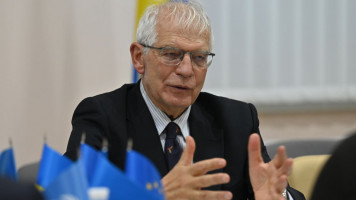Egypt government linked to major hacking operation against activists, opposition figures
Egypt government linked to major hacking operation against activists, opposition figures
Egypt joins its allies the UAE and Saudi Arabia in being implicated in major hacking attempts against opposition activists.
3 min read
Sophisticated cyberattacks allegedly enabled Egypt to gain access to activists' phones [Getty]
The Egyptian government likely launched a series of sophisticated cyberattacks against activists, journalists and opposition figures, an cybersecurity firm has found.
Among those targeted are opposition politician Khaled Daoud and academic Hassan Naffaa, both arrested last month as part of a sweeping crackdown on dissent in the wake of unprecedented protests against the rule of Egyptian President Abdel Fattah al-Sisi.
At least 33 people were targeted in an organised campaign starting in 2016, according to a report by Check Point Software Technologies.
The cybersecurity company said the attacks can be traced back to the Egyptian government, according to The New York Times.
The attackers installed software on the victims' phones that enabled them to read the targets' files and emails, identify who they contacted and when, and track their locations.
Sophisticated apps allowed the attackers to gain access to the victims' locations, even when they had turned location services off.
They were also able to copy the details of all phone calls made on the victims' phones.
The central server used in the attacks was registered to the Egyptian ministry of Communications and Information Technology and geographic coordinates embedded in one of the applications used corresponded to the headquarters of Egypt's General Intelligence Service, Check Point said.
The cybersecurity firm said that, while it was possible the coordinates had been planted by a hacker attempting to implicate the Egyptian government in a false flag, it was more likely that they had accidentally been left in out of sloppiness.
The company's investigation also indicated the attackers were native Arabic speakers and the default time used in the apps was Egyptian time.
The specificity of their targets - all well-known opposition activists, civil society figures, journalists and academics - also points to the likelihood the Egyptian government carried out the attacks.
"We discovered a list of victims that included handpicked political and social activists, high-profile journalists and members of nonprofit organizations in Egypt," Aseel Kayal, a Check Point analyst, told NYT.
One victim of the attacks, Dr. Shady al-Ghazaly Harba, was arrested last year for his online criticism of the government.
A surgeon and opposition activist, Dr. Harba is currently being held in solitary confinement in Cairo, where he faces charges of insulting the president and spreading false news.
Other victims included political scientist Hassan Naffaa and former Constitution Party head Khaled Daoud, both arrested last month as part of a sweeping crackdown on dissent.
Protests against Sisi broke out last month after a series of videos alleging endemic corruption by the president and his military clique went viral, sparking mass outrage.
More than 2,300 people, including 111 children, have been detained so far in the mass arrest campaign, according to the Egyptian Center for Social and Economic Rights.
Egyptian activists living in Canada, the UK and the US were also targeted, according to Check Point. Among those targeted abroad was 81-year-old veteran civil society activist Afaf Mahfouz.
Lawyer and human rights activist Ragia Omran and the head of Egypt's Socialist Popular Alliance party, Medhat al-Zahed, were also victims of the campaign.
"These targeted surveillance campaigns represent an escalation of the tactics employed by Egyptian authorities in their systematic efforts to intimidate and silence civil society in the country," Danna Ingleton, deputy director of Amnesty International's internet rights program, told NYT.
"Instead of developing new means to crush dissent, the authorities must end their relentless onslaught against human rights defenders and respect the rights to freedom of expression and association."
Egypt's top allies the UAE and Saudi Arabia have also been implicated in hacking attempts directed against prominent activists.
Canada-based Saudi dissident Omar Abdulaziz launched a lawsuit against Israeli spyware company NSO Group last year, alleging that the hacking of his phone endangered the life of journalist Jamal Khashoggi.
NSO's spyware technology Pegasus has been sold to multiple governments and been used to target high-profile figures and activists across the world.
Amnesty earlier this year sued the Israeli Defence Ministry, accusing it of putting human rights activists at risk by allowing the export of NSO technology.
Follow us on Twitter: @the_newarab
Among those targeted are opposition politician Khaled Daoud and academic Hassan Naffaa, both arrested last month as part of a sweeping crackdown on dissent in the wake of unprecedented protests against the rule of Egyptian President Abdel Fattah al-Sisi.
At least 33 people were targeted in an organised campaign starting in 2016, according to a report by Check Point Software Technologies.
The cybersecurity company said the attacks can be traced back to the Egyptian government, according to The New York Times.
The attackers installed software on the victims' phones that enabled them to read the targets' files and emails, identify who they contacted and when, and track their locations.
Sophisticated apps allowed the attackers to gain access to the victims' locations, even when they had turned location services off.
They were also able to copy the details of all phone calls made on the victims' phones.
The central server used in the attacks was registered to the Egyptian ministry of Communications and Information Technology and geographic coordinates embedded in one of the applications used corresponded to the headquarters of Egypt's General Intelligence Service, Check Point said.
The cybersecurity firm said that, while it was possible the coordinates had been planted by a hacker attempting to implicate the Egyptian government in a false flag, it was more likely that they had accidentally been left in out of sloppiness.
The company's investigation also indicated the attackers were native Arabic speakers and the default time used in the apps was Egyptian time.
The specificity of their targets - all well-known opposition activists, civil society figures, journalists and academics - also points to the likelihood the Egyptian government carried out the attacks.
"We discovered a list of victims that included handpicked political and social activists, high-profile journalists and members of nonprofit organizations in Egypt," Aseel Kayal, a Check Point analyst, told NYT.
One victim of the attacks, Dr. Shady al-Ghazaly Harba, was arrested last year for his online criticism of the government.
A surgeon and opposition activist, Dr. Harba is currently being held in solitary confinement in Cairo, where he faces charges of insulting the president and spreading false news.
Other victims included political scientist Hassan Naffaa and former Constitution Party head Khaled Daoud, both arrested last month as part of a sweeping crackdown on dissent.
Protests against Sisi broke out last month after a series of videos alleging endemic corruption by the president and his military clique went viral, sparking mass outrage.
More than 2,300 people, including 111 children, have been detained so far in the mass arrest campaign, according to the Egyptian Center for Social and Economic Rights.
Egyptian activists living in Canada, the UK and the US were also targeted, according to Check Point. Among those targeted abroad was 81-year-old veteran civil society activist Afaf Mahfouz.
Lawyer and human rights activist Ragia Omran and the head of Egypt's Socialist Popular Alliance party, Medhat al-Zahed, were also victims of the campaign.
"These targeted surveillance campaigns represent an escalation of the tactics employed by Egyptian authorities in their systematic efforts to intimidate and silence civil society in the country," Danna Ingleton, deputy director of Amnesty International's internet rights program, told NYT.
"Instead of developing new means to crush dissent, the authorities must end their relentless onslaught against human rights defenders and respect the rights to freedom of expression and association."
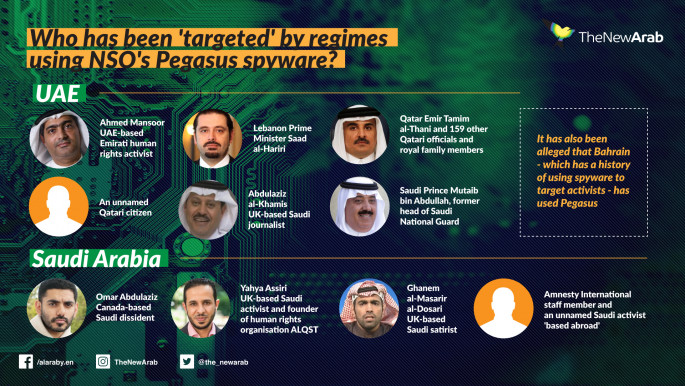 |
Canada-based Saudi dissident Omar Abdulaziz launched a lawsuit against Israeli spyware company NSO Group last year, alleging that the hacking of his phone endangered the life of journalist Jamal Khashoggi.
NSO's spyware technology Pegasus has been sold to multiple governments and been used to target high-profile figures and activists across the world.
Amnesty earlier this year sued the Israeli Defence Ministry, accusing it of putting human rights activists at risk by allowing the export of NSO technology.
Follow us on Twitter: @the_newarab

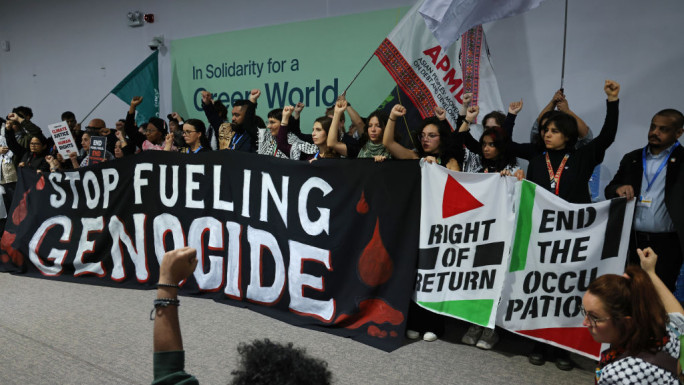

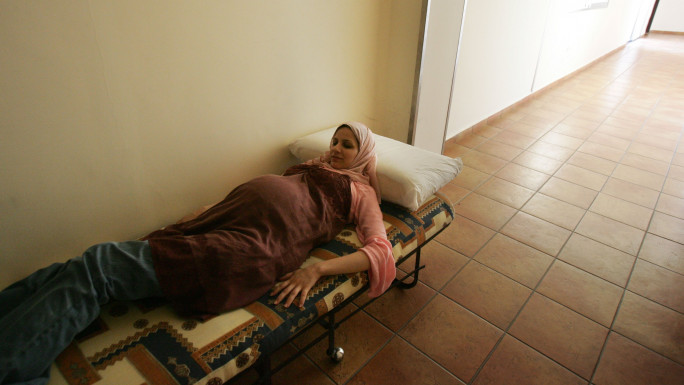

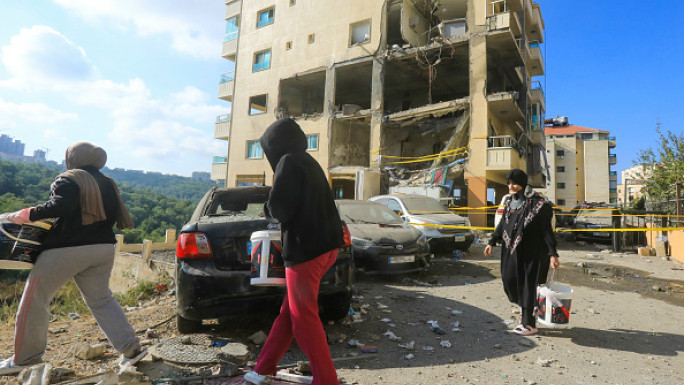
 Follow the Middle East's top stories in English at The New Arab on Google News
Follow the Middle East's top stories in English at The New Arab on Google News
![Gazans reel after Israel strike [Getty]](/sites/default/files/styles/image_330x185/public/2183300682.jpeg?h=a5f2f23a&itok=fN-GAQGE)

